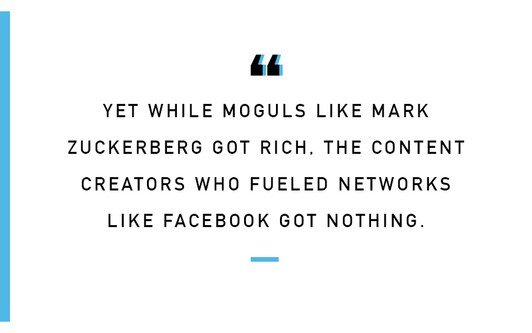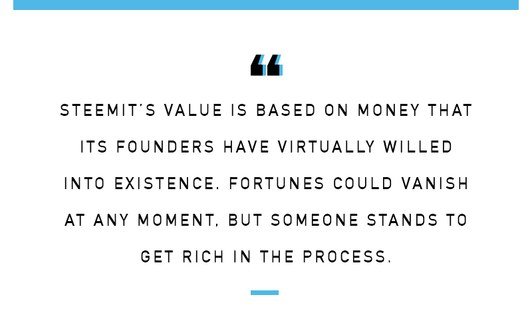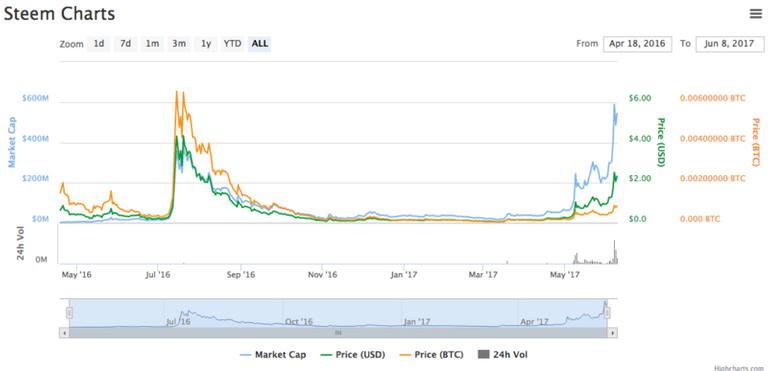THE SOCIAL NETWORK DOLING OUT MILLIONS IN EPHEMERAL MONEY:
Every time you log onto Facebook, Instagram, or Twitter to share a photo or post an article, you give up a piece of yourself in exchange for entertainment. This is the way of the modern world: Smart companies build apps and websites that keep our eyeballs engaged, and we reward them with our data and attention, which benefit their bottom line
Steemit, a nascent social media platform, is trying to change all that by rewarding its users with cold, hard cash in the form of a cryptocurrency. Everything that you do on Steemit—every post, every comment, and every like—translates to a fraction of a digital currency called Steem. Over time, as Steem accumulates, it can be cashed out for normal currency. (Or held, if you think Steem is headed for a bright future.)! medium_Screenshot_2017-06-09_00.04.59.png
The idea for Steemit began with a white paper, which quietly spread among a small community of techies when it was released in March 2016. The exhaustive 44-page overview wasn’t intended for a general audience, but the document contained a powerful message.
Yet while moguls like Mark Zuckerberg got rich, the content creators who fueled networks like Facebook got nothing. Steemit’s creators outlined their intention to challenge that power imbalance by putting a value on contributions: “Steem is the first cryptocurrency that attempts to accurately and transparently reward…[the] individuals who make subjective contributions to its community.”
Cryptocurrencies like Bitcoin are only worth whatever value people ascribe to them, so there was no guarantee that the tokens dropping into Steemit accounts would ever be worth anything. Yet the Steem that rolled out to users translated to more than $1.2 million in American dollars. Overnight, the little-known currency spiked to a $350 million market capitalization—momentarily rocketing it into the rare company of Bitcoin and Ethereum, the world’s highest-valued cryptocurrencies.
Today, Steem’s market capitalization has settled in the vicinity of $294 million. One Steem is worth slightly more than one United States Dollar, and the currency remains a regular presence at the edge of the top 20 most traded digital currencies.
THIS IS WHY Steemit Is The Future of Social Media! – Get Paid To Post!
More than $30 million worth of Steem has been distributed to over 50,000 users since its launch, according to company reports. It’s too early to know whether Steemit can hold onto its users’ interest and its market value. But its goal—upending a model built by social media giants over decades of use in favor of a more populist system—is significant in itself. By removing the middlemen and allowing users to profit directly from the networks they participate in, Steemit could provide a roadmap to a more equitable social network.
The creators of Steemit didn’t set out to build a social network. When Ned Scott and Dan Larimer first spoke on the phone in mid-2015, having previously chatted online, they began dreaming up new applications for blockchains—the distributed, verified databases that back today’s wave of digital currencies. Scott, a former financial analyst, was fascinated by the economics that drive cryptocurrencies. Larimer, a computer scientist, already had cryptocurrency bona fides, having developed an ambitious exchange called BitShares.
Today, Scott supports the software development of the platform and currency from the company headquarters in Austin, Texas, alongside a distributed team of 30 staff worldwide. ! “On Steemit, people show up to earn Steem. They’re posting and linking stuff, and they’re earning something that’s worth real money.”
A weighted voting system places greater value on votes placed by the older accounts of early Steemit adopters, who appear to be in it for the long haul. While a vote from a brand-new user may be worth a fraction of a cent, a vote from someone who has gained a reputation for posting quality content each day might be worth several dollars. In turn, the valuable votes of these “power users” attract votes from a crowd of less powerful users seeking to cash in on the action, like ants jostling for crumbs.
Hi! I am a robot. I just upvoted you! I found similar content that readers might be interested in:
https://www.wired.com/story/the-social-network-doling-out-millions-in-ephemeral-money/